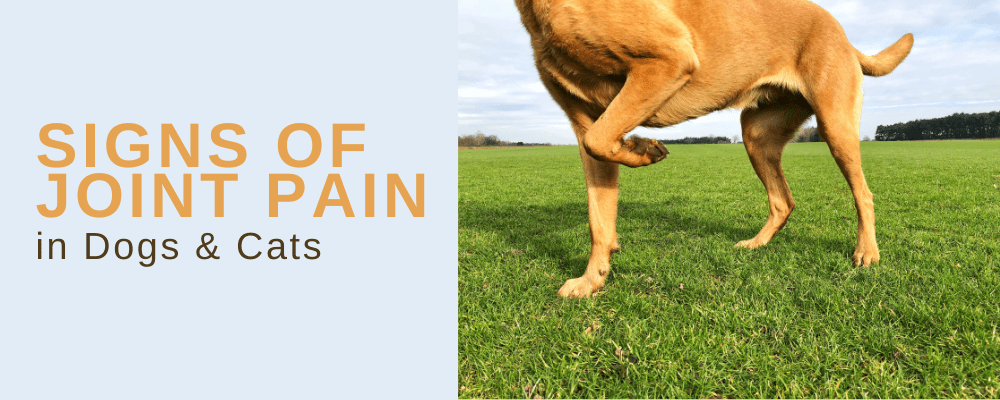If your pet is gradually slowing down or moving awkwardly, it is likely an indicator that they’re experiencing some type of joint pain. Joint pain is a common condition affecting pets of all ages, affecting their quality of life and potentially leading to quite serious conditions and injuries if left unchecked.
Dogs and cats do not necessarily cry when they are in pain. A better indicator of pain is disability. If they are having any of the following symptoms, they may be in pain:
- Limping or favoring one side of the body or leg
- Difficulty moving, stiffness
- Fatigue
- Disinterest in exercise
- Failure to use the litterbox
- Aversion to handling
- Licking or biting affected area
- Irritability or aggression
- Slow getting up and down
- Difficulty jumping
Developmental Joint Problems
Developmental joint issues are generally caused by genetic mutations causing the pet’s joints to develop improperly when they are growing up. Conditions like elbow dysplasia, hip dysplasia and luxating patellas are examples of developmental joint problems.
Many breeds of dog are predisposed to some variety of joint issues that will cause them pain. For example, Rottweilers are prone to developing knee and ankle joint problems, Bernese Mountain Dogs commonly develop elbow dysplasia and Newfoundlands are one of the breeds that are most prone to developing issues in their cruciate ligament.
If you’re purchasing a dog from a breeder, it may be a good idea to consider asking them about any genetic predispositions their breed or lineage may have to joint issues. A good breeder will be able to provide you with this information unprompted but it never hurts to ask.
Degenerative Joint Problems
Degenerative joint issues are caused by repeated use of your dog’s joints over time, including the wearing down of cartilage or the injury of ligaments and tendons. The most common of these kind of joint issues is cruciate ligament rupture, where the ligament degenerates over time and with repeated use it tears.
When it comes to degenerative joint issues, the root cause will vary widely. They can range from stress fractures to injuries and osteoarthritis. But often they will develop in overweight pets since excess weight places more stress on your pet’s joints over time.
Treatments for Joint Pain in Dogs
The appropriate treatment for joint pain and its underlying cause in your dog will vary based on its severity and the specific root cause.
While the specific treatment may vary from case to case, the goal of treatment is to get them back to their regular level of activity and mobility. This is especially important for your dog’s long-term health since well-developed muscles around their joints will actually help to reduce the load those joints have to bear themselves. An active dog is a healthy dog.
Most treatments will also involve an assessment of your dog’s weight compared to their size. If they are overweight, they are placing extra strain on their joints and a diet may be prescribed to help ease the weight their pained joints have to bear.
Beyond that, your veterinarian may recommend nutritional supplements, anti-inflammatory medications, physical rehabilitation or environmental modification. A multi-modal approach where multiple treatment modalities are employed usually works best to relieve joint pain. Your veterinarian will help you determine what is best for your pet. If your dog or cat shows any of the above symptoms, call us to schedule and evaluation and treatment plan.
